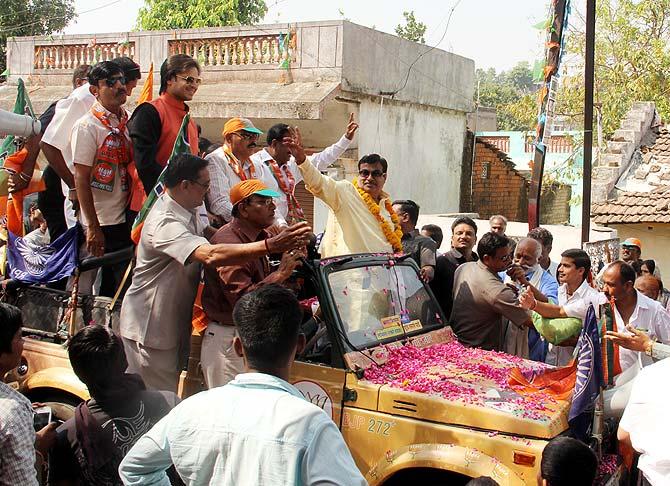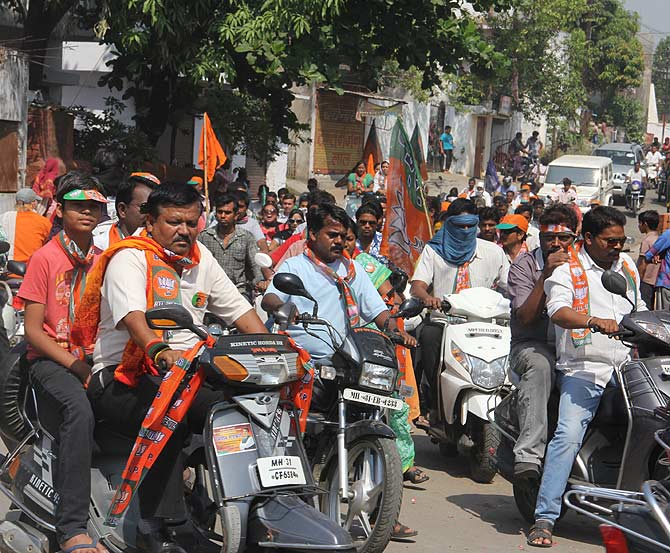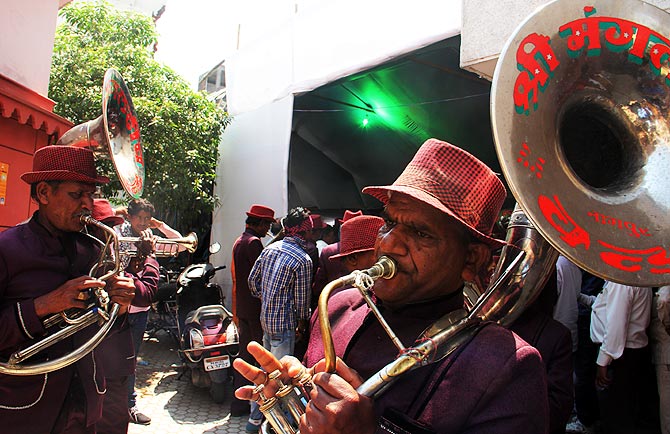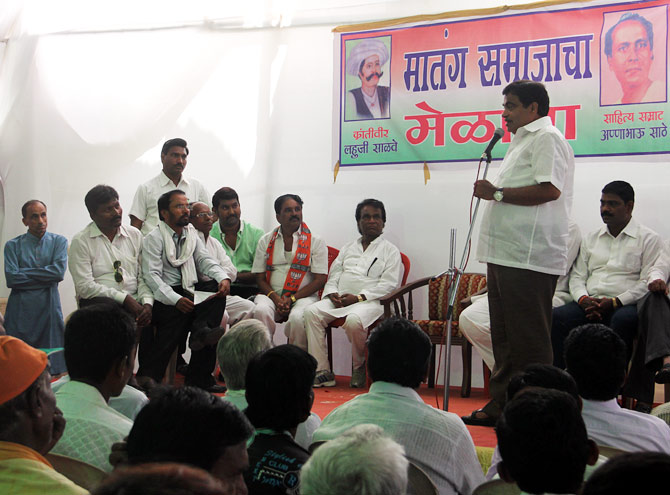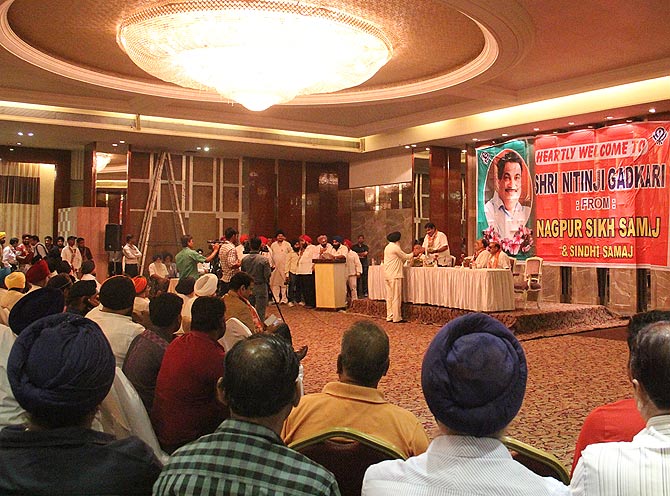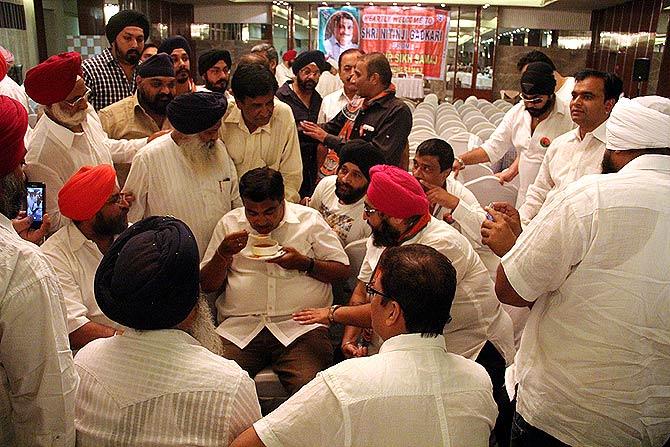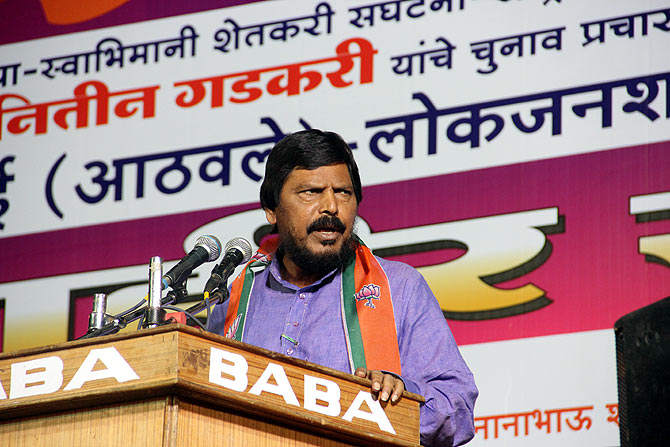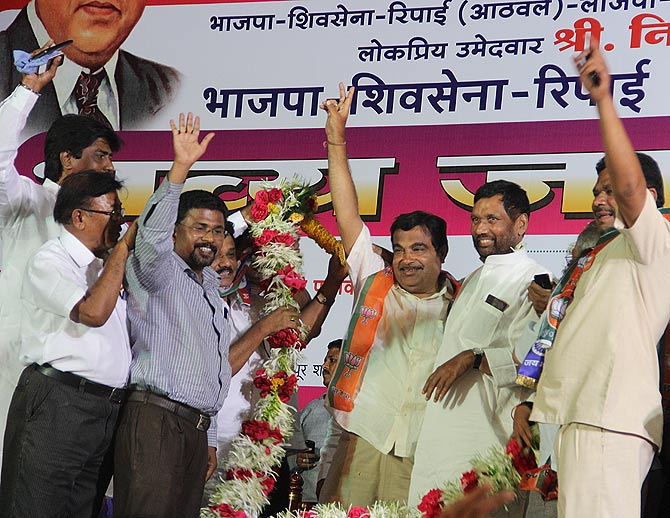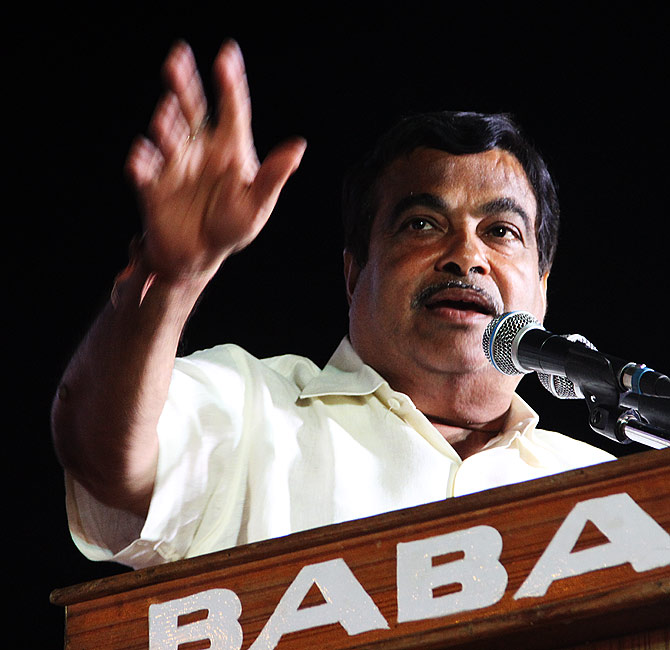 | « Back to article | Print this article |
'We are thinking about the rationalisation of the tax system'
'Secularism does not mean appeasement of terrorists all the time. Secularism does not mean you have to appease anybody. Justice for all and appeasement for none. That is the role of a secular party.'
"So that will remain?"
'100 percent.'
"What about the UPA's policies of NREGA, the Right to Food. Will they continue in a Modi Sarkar?"
'These policies have no relevance... We will find which are the schemes that are suitable and those we will continue. And those which are only politically motivated we will take them out.'
BJP leader Nitin Gadkari explains to Vaihayasi Pande Daniel/Rediff.com what a Modi Sarkar will mean for India.
In election booths across Nagpur on April 10, voters may have pushed the button against the lotus on electronic voting machines if they wanted to vote for the Bharatiya Janata Party's candidate, Nitin Gadkari.
It would have been more appropriate had they pressed a button with a flyover on it. :)
Flyovers are the symbol more associated with Gadkari, a former BJP national president, in Nagpur and his native state, Maharashtra.
When you arrive in Nagpur a few days before Election Day, you don't need directions to reach the home of The 55-Flyovers Man.
Everyone knows where Nitin Gadkari lives. Many quick flyovers get you there. His towering home in the area, Gadkari Wadi, is close to the Rashtriya Swayamsevak Sangh's national headquarters. Local citizens tell you he has built all the roads and flyovers in these parts, including the super-smooth Orange Flyover, that takes you past a giant orange, when you ascend onto it.
At his bungalow you are told that Gadkari, probably to beat the murderous Nagpur summer heat, departed early morning for a road show in west Nagpur and to catch up with him there.
His large rumbling cavalcade appears from the distance like a segment of a Republic Day parade. A battalion of speeding motorcyclists, sporting orange hats, orange scarves, orange flags, NaMo masks, leads the charge, swarming swiftly at you like a runaway orange Mexican wave.
A beaming Gadkari, looking reasonably trim after his bariatric surgery, rides along with Bollywood star Viveik Oberoi, in an open jeep that moves lightning fast. Black-uniformed security guards hang out from the rear and sides.
The only way to keep pace with the juggernaut is to hop a ride with an obliging BJP volunteer motorcyclist and become a NaMo groupie for a few hours. To temporarily inhabit the Modi Wave, joining in with the shouting of catchy ditties about Naya Bharat Banayenge.
Please click Next to read further...
Firecrackers. Flowers. Slogans and songs.
The tableau moves along like something out of a mythological television serial.
Loud, fast and colourful.
Firecrackers. Rangoli. Flowers. Slogans and songs. Oberoi and Gadkari bring out the crowds and the roads are lined with cheering people.
Women in bright saris wait at strategic street corners, holding diya-laden thalis, hoping to do a quick tikka-jaymala and throw rose petals. Gadkari stops no more than 4 to 5 minutes at a spot. The road show seems very carefully choreographed.
For three hours we race fast-forward through 20, 25 localities, in the scorching 43 degree C sun -- TV Tower area, Friends Colony, Welcome Colony, Ganga Nagar, Hazari Pahar -- past ornate palatial bungalows, tiny huts, modest homes -- visiting the wealthy, the poor, the middle income -- waving at doctors, dhobhis, businessmen, housewives...
At one point we run into a cow, who takes off in a fright, galloping down the road, running away from the Modi Wave. Or the Bollywood star. Or both.
Post the exhausting road show, Gadkari, still smiling benignly, fresh as a daisy or is it a lotus, has a whole string of engagements lined up all over town.
Please click Next to read further...
'Amit Shah never talks anything that is nonsense'
Waiting at his home, along with his two dogs is a good chunk of Nagpur's Matang or Mang community, kitted out in their best band uniforms and incongruous checked fedoras, banging away at their drums and blowing desi-style wind instruments.
The Matangs belong to Dalit society and have traditionally been village musicians. In the cities they join band-baja outfits, playing at weddings and other ceremonies.
A cross-section of Matangs have come to offer their support to Gadkari in this election. They fete him. Havan-ise him. Speeches that follow a baap-beta script, with the BJP leader telling them what they need to do with their lives, how to better their lot and that of their children. He emphasises the importance of education.
In the middle of this noisy tamasha, he politely invites you on stage for an interview, least concerned with the interruption it will cause to the show put on by the band-baja folk. He patiently answers questions, attempting to hide his irritation at many of them, maintaining affability and charm throughout:
Nitin Gadkari: This is the first time I am contesting. It has been a very good response from the people, from the heart. I am very confident, that with the support of the people, I will get good margin.
In many elections, that the party has contested, I have worked more than the candidate who was contesting!
This is not the first time I have faced an election. It is very obvious and natural for me. But as a candidate I am going to contest for the first time. It is not a big thing for me to contest the elections.
What changes should India expect from the Modi Sarkar?
Firstly, we will reduce the price rise, particularly the inflation by 25 per cent. At the present, the economy is in a very bad shape. It is time for us to save this country.
Economic crises. Crisis of security, internal and external. Unemployment problem is deep. Farmers are committing suicide.
The Congress party has totally failed in running this country. It is time for change now. People are expecting some change.
So what socio-economic changes are you looking at?
First of all, we will strengthen the country, strengthen our economy, reduce the inflation, increase the export and at the same time the value of the rupees. It is now going to be Rs 62 (per dollar). It is not good for India.
We will make (the economy) friendly to industry and business. Increase the employment. That will definitely change the prospect of the country.
What is the party's and your thoughts on the minority communities?
First of all, this is a story of image versus reality. Ground reality versus the perception.
Our party does not want to play the game of discrimination on the basis of caste, religion, sex. Or any other discrimination. Our basic principle is justice for all. And appeasement of none.
Equal opportunity for progress. Equal opportunity for the rights. There will be no discrimination...
And in the nine states, where we have ruled, we have already executed that policy. So what is the problem?
So you are saying the policy of secularism will remain in this country?
(Slightly exasperated) What is the meaning of secularism?
Secularism does not mean appeasement of terrorists all the time.
Secularism does not mean you have to appease anybody. Justice for all and appeasement for none. No discrimination on the basis of caste, creed, religion, sex.
That is the role of a secular party.
So that will remain?
100 percent.
What about (the BJP's leader in charge of the election campaign in Uttar Pradesh) Mr Amit Shah's speech? People are very worried about the implications of his speech.
(The situation) seems to be have been misinterpreted. Amit Shah never talks anything that is nonsense.
But the people who talk nonsense, the media are not talking about. Like the way in which the Congress candidate (Imran Masood) from (Sahranpur) talks. The way in which he speaks is very serious.
When someone talks anything useless, very, very anti-social, anti-national, anti-democratic, we are expecting that the Election Commission should take a stern action against them.
At the same time, when our (party) people are giving some answer, unnecessarily people are making allegations against Amit Shah... Totally baseless.
Please click Next to read further...
'If there's an Olympics for corruption, gold medal goes to Manmohan Singh and Sonia Gandhi'
Gadkari, 56, a Nagpur native, started out in politics in his teens, when he worked for the Akhil Bhartiya Vidyarthi Parishad, the Bharatiya Janata Pary's youth wing. He went on to fight student elections, then won a seat on the state legislative council and slowly graduated to state and national politics.
Gadkari runs several businesses and is a lawyer by training. During his 1995-1999 tenure as Maharashtra's Public Works Minister, 55 flyovers were built across Mumbai, the Mumbai-Pune Expressway was constructed and some 13,736 Mahrashtra villages were connected by road.
The politician has earned a fair amount of goodwill in Nagpur for the projects he is said to have brought to fruition. Folks living in the Muslim Mominpura area or the Dalit Buddhist areas of north Nagpur, or others falling out of his core voting base, may not have any plans to vote for him. But without prompting, praise Gadkari for his good image and his willingness to help people.
You are told often, all over the city:
"He has done good work. He helps people," says Mohammed Shahid, who runs a hat stall.
"He is a good man," says Bahujan Samaj Party corporator Gautam Patil.
"A fine person. He has built so many roads in the state. And flyovers," says Shravan, who works as a driver.
"He is a decent man and has done good work," says Sanjay Meshram, who works at a financial company.
"Gadkari ka personal image achcha hai. But his party is wrong," says Anil Borkar, a social activist.
"If he was running as an Independent candidate and not on the BJP ticket we would vote for him," says Mohammed Shabir, a shopkeeper.
Gadkari has a reputation of being readily accessible. Anyone can visit his home with a personal issue and receive assistance. Says Borkar: "If you go to his house, with a problem, he will first ask if you would like some tea, or a glass of water. And then ask you what your problem is."
He is known to be generous as well. Aiding people requiring heart surgery or eye operations is routine. Borkar says it is known around town that when someone says they are going to the Wadi, they are going to meet Gadkari for assistance, that often might be financial.
"He is the kind of man who will tell the har-wallah, who made a garland for a public meeting, to come to his home and collect Rs 1,000."
The origins of his enormous wealth are equally debated about. There were allegations about irregularities in his dealings with the Purti Group (that owns cooperative stores, sugar and ethanol factories in the region) that led to his resignation as the BJP's national president. Aam Aadmi Party leader Arvind Kejriwal added his name to a list of the most corrupt people in India which led Gadkari to sue him.
If Mr Modi comes to power, how will the issues of corruption be solved?
Definitely, BJP is always against corruption. We will take strong steps against corruption. We will give clean, transparent governance. We are thinking about the rationalisation of the tax system. No permit licensing raj. We have to make it digitalised.
Try to make it more transparent, time bound and result-oriented.
There is an uproar about the corruption perpetuated by the UPA2 government. Do you think Congress President Sonia Gandhi is directly responsible for the failure of UPA2?
(Laughs heartily) I feel if there is an Olympics for corruption and price rise, the gold medal will go to (Prime Minister) Manmohan Singh and Sonia Gandhi. They have made a world record of corruption.
They are responsible for it. The people have put hope in them. They are the leaders of the UPA and the Congress party. Under their leadership all this corruption and scandals are going on.
What is your definition of development?
My feeling is that politics is an instrument of socio-economic reforms.
India is facing problems of poverty, hunger and basic unemployment. These are the grass root issues of the country.
We are a rich nation with a poor population (a favourite line which he repeats in many places). That is only because of the wrong economic policies, bad, corrupt governance and vision-less leadership not taking decisions.
The country has the potential to become a superpower in the world.
My definition of politics is giving housing to the poor people, giving employment to the needy. And development -- road, water, power, transport, communication. And all types of infrastructure in the village area by which we can encourage the process of development in the rural areas.
What are the five things that you think the Modi Sarkar can do?
Irrigation.
Houses for the poor people -- low-cost, affordable housing.
Thirdly, 24-hour power.
Fourth, road connectivity for all villages and cities. The four-laning of the national highway.
And the most important is river connectivity by which we can work in irrigation, and at the same we can reduce our damages because of the floods.
Please click Next to read further...
'To do good work, more important than technology or money, is the need for strong political will'
The Sikh Samaj is laying out a sumptuous lunch for Gadkari at the city's plush Centre Point hotel, which is owned by a local Sikh, Mickey Arora.
Since noon, Nagpur's Sikhs, in their snazzy best, are trickling into the hotel. By the time Gadkari arrives, after his adventures with the band baja folks, it is past two. More than a 1,000 Sikhs have gathered at the chandeliered banquet hall.
The afternoon takes off laboriously. Heads of each gurdwara, and many absentee ones, are called to the stage to garland a patient Gadkari.
His 20-minute speech moves fairly efficiently and credibly between what is wrong with the present system/economy ("In Madhya Pradesh the agricultural growth rate is 18 percent, in Gujarat it is 11 percent and in Maharashtra it is less than zero, in the minus"), his achievements and his plans for the city.
When the audience complains they cannot see him, he picks up his podium and takes it up onto the stage. "Now can you see me?" he asks, to huge applause.
Gadkari says, proudly, that once he had made a decision to fight the 2014 election, he was invited to contest from several constituencies. Indore asked him. Madhya Pradesh Chief Minister Shivraj Singh Chauhan requested him to run from Bhopal. The BJP's Mumbai unit invited him to contest from Mumbai North. It was proposed he run from Bhandara, where he says he has worked with farmers helping them grow sugar crops to convert to ethanol fuel.
But he felt Nagpur was his city and he needed to run from there. And so here he is...
"I always say to do good work, more important than technology or money, is the need for strong political will. When you have strong political, so much can be done."
Gadkari says if he is elected, his main agenda is development and promises to make Nagpur a top-rank city. He also makes a guarantee to create employment for 50,000 youth within two years.
"I am a person of my word. I say truthful things. I say truthfully what I can do. What development that has not been done in 25 years in this year I will do in five years... Like you are standing by me I will stand by you."
Please click Next to read further...
'If we get elected, Modi will be prime minister. There is no dispute in the party on this'
Quite like a traditional fundraising meal you might see elsewhere in the world, but perhaps less often in India, this meeting is a formal promise from the Sikh community of their support for Gadkari's candidature and to spread the word that people should vote for him.
Local Sikh businessmen tell you they consider Gadkari an attractive and appropriate candidate. They say he has always worked to provide superior infrastructure in the city, especially roads. He is also very approachable.
Surinder Singh, who heads the local transport union, explains, "He has always solved our problems." That included issues with strikes, labour or taxes.
Gadkari, in a genial mood, after the round of speeches, tucks into two scoops of ice cream, topped with bright pink sauce, a bowl of steaming tomato soup and more, as he chats animatedly with Sikh businessmen and community leaders, before taking off for his next meeting.
Why was L K Advani's candidacy for prime minister set aside?
This is entirely a party thing. Modi proved to be the popular leader of the party... The party has taken a decision to support him.
But leaders like Mr Advani, Jaswant Singh and Yashwant Sinha represent a certain amount of experience. How can you do away with that experience in foreign affairs, the economy and so on?
You people have a habit to talk both the ways. Sometimes you are asking why I am not encouraging the young leadership in the party.
Not you personally. But the media has a habit...
Suppose we are giving a chance to new leadership, then (we are asked) what will happen to your old leadership.
If old leaders are projected, then what will happen to youth leaders?
This is the time for the party to project the person who is most popular. Already Advani has supported Modi. If we get elected, Modi will be the prime minister. There is no dispute in the party on this.
Please click Next to read further...
Time to forget Gujarat 2002 and vote for the BJP, says Athawale
One of Gadkari's final engagements on a long, gruelling, day is a public meeting at Indora, the northern Dalit Buddhist neighbourhood in Nagpur. Wooing Dalit voters is no simple proposition. Gadkari, in the concluding run-up to Election Day, is making a pointed effort to reach out to the community.
Dalits, who make up more than 25 percent of Nagpur's population, are not traditional BJP voters. All stops have been pulled out for this meeting.
Republican Party of India-Athawale President Ramdas Athawale is a speaker at the event. His party is part of the National Democratic Alliance.
A surprise presence is Ram Vilas Paswan, the Dalit leader from Bihar whose Lok Janshakti Party abandoned the UPA and joined the NDA recently.
Gadkari is running late.
Athawale refuses his swanky garland till Gadkari arrives. He sits restlessly on stage, making a show of taking notes, irritation writ large on his face, as a bunch of lesser leaders wax and wane, delighted to hear the sound of their voices for so long.
Athawale, finally, reluctantly, takes to the podium. A shower of fireworks drown out his opening words, adding to his irritation. His gravelly voice, his clear enunciation and straight talk make him a dramatic speaker, although there is not even a ghost of a smile on his face, even when he says something bordering on amusing, or at any time during the evening.
He speaks about the development which can be seen in Gujarat, but not in Maharashtra, the fact that Pakistan is a country of terrorists, the Congress' broken promises to Dalits (Athawale's party was part of the UPA not long ago).
While condemning the post-Godhra riots (to the sudden confusion of those on stage), Athawale adds it is time people forgot those dark days and voted for Gadkari and the BJP
He departs before Gadkari arrives, after receiving a plump marigold garland entwined with the RPI's blue colours.
Please click Next to read further...
'The RSS never interferes in the political activity of the BJP'
Ram Vilas Paswan arrives shortly before Gadkari. There is some back and forth about who will speak first, since Gadkari has to take off for some more meetings and it is a long night ahead.
Like other vintage speakers from Nagpur -- the city is famous for its passionate and articulate orators, reveals my colleague Uttam Ghosh -- Gadkari comes across as a competent speaker, attempting to speak sincerely and directly to his audience.
His speech is reasonably short on propaganda, gets right to the point, listing out, in a business-like manner, his agenda for Nagpur -- water, inflation, fighting corruption, agricultural growth, employment, education, hospitals, electricity -- and the time frame for completing each project.
"Farmers are committing suicide in (adjoining district) Vidharba. Sharad Pawar is our agriculture minister. 10,000 farmers have committed suicide. When people ask me what the difference is between the Congress and BJP I like to give them the figures... in Madhya Pradesh the agricultural growth rate is 18 percent, in Gujarat it is 11 percent and in Maharashtra -- with Sharad Pawar the agriculture minister and the Congress-NCP (Nationalist Congress Party) at the helm -- agricultural growth is less than zero, in the minus... Other states, that were considered backward, have gone ahead of us."
Gadkari repeats often, in a ringing voice: "Everything is possible!"
He says he has been told that the Muslim community and the Dalits will not vote for him. "I have met so many of you and I know at least 50,000 people in this city personally... But if there are any of you out there who feel that I have ever discriminated, on the basis of caste or religion, then I put my hands together and say you do not have to vote for me."
He speaks about having helped so many with operations and medical procedures but in return he has never written them letters asking for their votes. "I will never say that. Vote mangne ke liye seema nahin ki (There is a limit to asking for votes)."
Paswan, the senior-most politician on the dais (despite his dark hair and his rather youthful looks, he is in his late 60s) has the last speech of the evening. He has a gruff, deep voice and speaks clear Hindi. Paswan speaks about his friendship with Gadkari, even though they have always been in different parties.
"Gadkari is no ordinary man..." Paswan tells his Dalit audience, "He can bring progress. Ram Vilas Paswan has come to tell you that you need to give Nitin Gadkari your blessing and your vote and bring him in with a huge margin."
Mr Gadkari, you have good relations across party lines. Why do you subscribe to this philosophy?
We are not opponents of each other. We are the friends. At the same time on the basis of ideology, we are different. In a democracy we need to maintain a good relationship with everybody.
I am just working like any other politician. I have got a lot of good friends in the Congress, NCP, Shiv Sena and everywhere.
I respect the leaders, those who belong to (other) political parties. We may have differences as per ideology. But ideological differences do not mean anything.
I feel that it is appropriate to maintain a good relationship with all types of social leaders and there should be a dialogue in democracy.
There may be a difference of opinion. That does not mean that we are enemies.
Raj Thackeray is a good friend of yours and you were trying to work out an alliance with the Maharashtra Navnirman Sena?
The Congress and the NCP are our main opposition. My impression was that, at any cost, we should not divide the votes against the Congress and NCP.
That is why I tried to (collect) all the votes from small parties... like from MNS, from Vinay Kore (of the Jan Surajya Shakti party). I appeal to them that they support the NDA. It is in the wider interest of the alliance. There was no question adding new party in the alliance, there was no question of giving a seat to anybody.
But Mr Thackeray's agitation against toll nakas goes against your policy of road development.
There is an exaggeration in the toll policy. No transparency. Lots of corruption. If you have good services you have to pay for it.
I constructed the Mumbai-Pune expressway, Mumbai flyovers. I was reasonably cautious about (costing) it. Today the problem is -- the estimates, the cost, the toll -- there is no transparency.
So there is more corruption in the process today?
If there are irregularities, then definitely the government has to take action against them.
Why did Mr Modi not come to Nagpur to campaign for you?
Nagpur is a good seat for me to be elected.
Was it anxiety about alienating Muslim votes if he came to campaign for you since you have good relations with the community?
He has concentrated on big seats and where there is a population. It does not mean anything (his not coming to Nagpur). The problem is that he cannot manage because the time is short.
So it is not about alienating possible Muslim votes?
It is not true. Already on every poster Narendra Modi is there. So why am I going to have a fear about that? He is our prime minister candidate.
It is very difficult for him, as one person, to go to every constituency.
When the BJP was in power under Mr Vajpayee it was a very BJP-esque government. Under the Modi Sarkar will it be a BJP government or more an RSS-type of government? Will the RSS have a stronger influence?
This is all a misunderstanding put in the mind of the people by a section of the media.
The fact is that the RSS never interferes in the political activity of the BJP. It is a social and cultural organisation. RSS is part and parcel of my life.
At the ground level it will be a BJP government, under the leadership of Narendra Modi.
So it will be a true successor to the Vajpayee government?
100 per cent.
Please click Next to read further...
'Congress is owned by Sonia. SP is owned by Mulayam, BSP is owned by Mayawati, Shiv Sena is owned by Uddhav'
What about the UPA's policies of NREGA, the Right to Food. Will they continue in a Modi Sarkar?
These policies have no relevance.
They are the policies motivated by political ambition and by taking advantage of the poor people. These are not the policies by which we can make some basic breakthrough into grassroot problems.
These are all political agenda of the Congress party. We will find which are the schemes that are suitable and those we will continue. And those which are only politically motivated we will take them out.
You told the Economic Times that there is too much democracy in your party. What did you mean?
It means we have a democratic party. No single man is powerful. It is a party where they always take a decision on the basis of.
Many times there are five people having three to four opinions because our party is not a family party.
Congress is owned by Sonia Gandhi, Samajwadi Party is owned by Mulayam Singh, Bahujan Samaj Party is owned by Mayawati, Shiv Sena is owned by Uddhav Thackeray. They are the owners of these parties.
As far as the BJP is concerned, no one is an owner. It is a democratic party running like a charitable trust.
What do you think about Mr Kejriwal and his role in unearthing corruption?
He is a confused leader. Now that jhadu (the broom, the Aam Aadmi Party's election symbol) you purchase from the market has a maximum time period for its life of six months. (In this manner) this party will collapse.
He is always talking the non relevant (stuff). He has nothing to do for the poor people. Only he is making the speeches. He is taking the advantage of the media.
Has he not had a role in focusing on the corruption of the UPA2 government?
It is the BJP who fights against the corruption. It is not Kejriwal. It is the BJP who fights against the corruption in Parliament and exposes it.
Should, for instance, iron ore mining be resumed in Karnataka, because it brings in money, if it is brought under an adequate legal and environmental umbrella?
What is your thinking about the use of natural resources like minerals in the pursuit of national prosperity? Should all this be thrown open to private players under the right legal framework, with the caveat that a portion of the profits goes towards development of the area?
We have to take the care of all legal and all environmental issues.
But at the same time we have to back the use of value addition of this iron ore by which we have increase the employment potential for our youth. So we should not stop that.
We have consider the environment point of view and consider all the law and rules and regulations it should be appropriate
If there is a victory in this election for the BJP, will it be because of Mr Modi? Or is it a party victory?
Will victory in this election be ascribed to Mr Modi alone, rather than the party?
First of all, every karyakarta (worker) belongs to the party. The party has its own ideology.
Every victory we get -- we have a policy in our party -- country first, second is party and third is the concerned person.
So definitely it will be a victory for the party and the party ideology. We are all working for the interests of the country.
Nation is the supreme thing for us -- we all work for the progress and development of this country, which we call our motherland.
If the BJP wins, would it be Modi's ideas about a new India that will be the real reason for the victory?
Now the number of journalists and media people has increased. They are very intelligent. And they are free to interpret (he smiles and then laughs).
First of all, every victory belongs to the party. Supposing I get a victory, it is a victory of Nitin Gadkari. It is a victory of BJP. Both.
So basically the victory for any individual is not the main (aspect).
The individual belongs to that political party, so it is a victory for that ideology and for that organisation. That is the basic thing behind it.
There are also BJP leaders, chief ministers, with equal importance as Mr Modi. How will they fit in with the people Mr Modi relies on?
This is all baseless and useless. There is no relevance at all. No one belongs to any individual. The fact of the matter is that we all belong to one ideology and one organisation. And Modi is our leader. So there is no problem about it.
We will all think together, work together, plan together and work for society, work for country and work for the poor man.
At the same time politics is instrument of socio economic reform and that is the mission of our life to eradicate the poverty, to increase the employment potential and to serve the last man in the society who is the poorest person in the society. To serve for him is the object of my party.
Now you saw in my house the band party that belongs to backward community. So these are the people (we want to help).
Who is your main support base?
All types of people are supporting me. I never play politics on the basis of caste, creed, sex, language and religion.
All type of voter. Young people. Everyone is supporting me. There is huge support from all sections of society.
I am really very lucky that people are supporting me.
